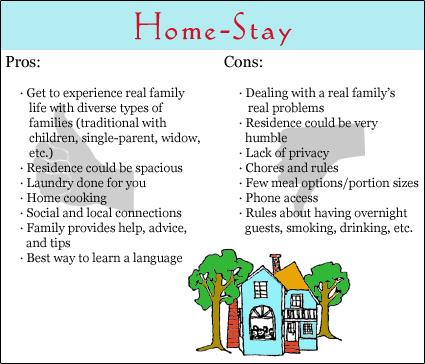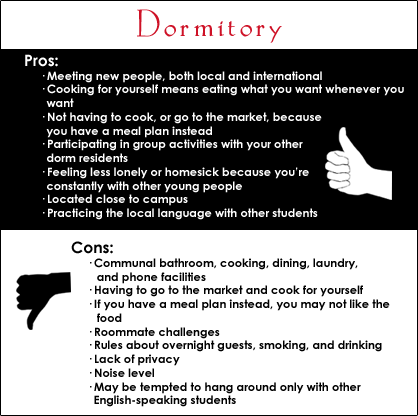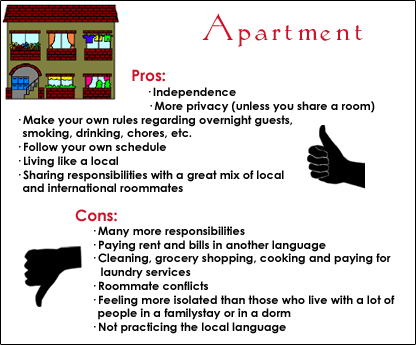Housing Arrangements
Your place of residence in the United States will become the main site of most of your cultural interaction. Where you choose to live in the United States can determine to what level you will immerse yourself in American culture.
The majority of your language practice and communication will not take place in the classroom, or even during your travels. Rather, most of it will happen at home in your residence. At your place of residence, you will experience the most intense and personal forms of culture-sharing, as the students you interact with become your family, friends and roommates.
Remember that living in a dorm or apartment as well as sharing that place with roommates will take some getting used to. Your place of residence in the United States comes with challenges, perhaps even more challenges than you had to deal with when (if) you lived with roommates at home. You will face language and culture differences which can affect everything from when a person eats a meal, to what he or she eats, personal hygiene issues, study habits, likes and dislikes, etc... However, keep in mind that your own habits and views will also seem different to the person(s) you are living with in the United States
1. Conflict Resolution
When thinking about housing in the United States, the most important thing to remember is patience. Try to be patient with yourself as you try to adjust to living with others in the United States. Also, try to be patient with those you live with, as they will be learning to adjust to you as well. In the chance that things just don't work out for you, or you just are not compatible with your roommates, make sure your residential life contract (if living on campus) offers you the right to change your place of residence. In case you are living with a host family, let your program coordinator know if you are experiencing problems. And if you are living in an off-campus apartment, things may be a little different as it may be tough to get out of your lease. In that situation, your best way out is to seek someone who may want to take over your lease and move in instead of you. Therefore, you will have to seek another place to live.
A lease is an official contract you sign with the person/persons who operate your apartment complex. The lease has its terms, to which you agree at the time of signing. Make sure you read the lease thoroughly to know what your rights are under the contract.
Ask your international student coordinators about your rights in regards to switching places of residence, and whether or not an administrator can help you find alternate housing should you need it. Your coordinators can act as conflict mediators to help you and your roommates or host family resolve any issues troubling you. If at any time you find your housing unsafe, be clear with administrators and explain to them why you feel this way and want to change housing as soon as possible.
2. Types of Housing
When choosing where you may want to live you should consider a number of things: cost, type and location to name a few. Some universities require first year students to live on campus, in which case you will not have a choice to live off campus. Different dormitories (dorms) and halls will vary in cost, so you should look closely as to what the rent will cost. If you choose to live in a typical dorm room, you will most likely be sharing that room with another student. Bathrooms are communal, which means that you share the bathroom with other people. There are also suites, which is more like a typical apartment. Then you may share the suite with 3 or more other people. If you live in a suite, you may be more likely to have your own room. Make sure you look at the residential life brochure of all on-campus living options to get a better idea of what your university offers.
Dormitories (often referred to as dorms) are traditional residence halls used to house students



3. Meals
Sometimes in the cost of living on campus the meal plan may be included. The meal plan allows you to eat at all food establishments on campus. You choose your meal plan based on how much you think you will consume. Most universities allow you to add more money to your meal plan in case you run out before the end of the semester.
4. Relevant Questions
- What are the pros and cons of living in a home–stay, residence hall/dorm or apartment environment while in the country of your choice?
- After making a list of pros and cons, which type of housing suits your needs best and why?
- Will you be living in a co–ed dorm or apartment while in the country of your choice, and does your program permit co–ed living?
- What can you do to help yourself prepare for the Rules, Privacy, Sharing, Telephone, Meals, Language and Social Network aspects of the type of housing you have chosen?
- Can you change your place of residence in the country of your choice if things don't work out?
5. Checklist
- I have made a list of the pros and cons of each type of housing available to me abroad.
- I have asked a study abroad administrator if I can change my place of residence abroad in the event that things don't work out.
- After making a list of pros and cons, I have decided which type of housing suits my needs best and why.
- I realize that it may take time for me to adjust to the Rules, Privacy, Sharing, Telephone, Meals, Language and Social Network aspects of the type of housing I have chosen.
6. Resources
- AllAbroad.us – Housing: Hear from mentors common questions and answer students have about host families and housing abroad.




 United States
United States


